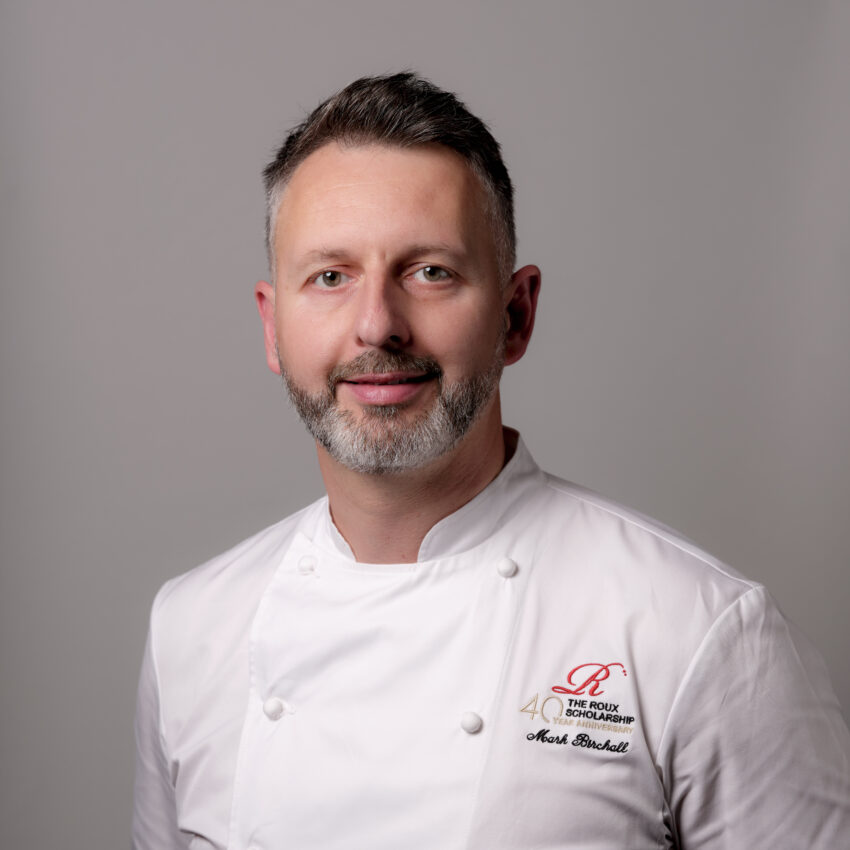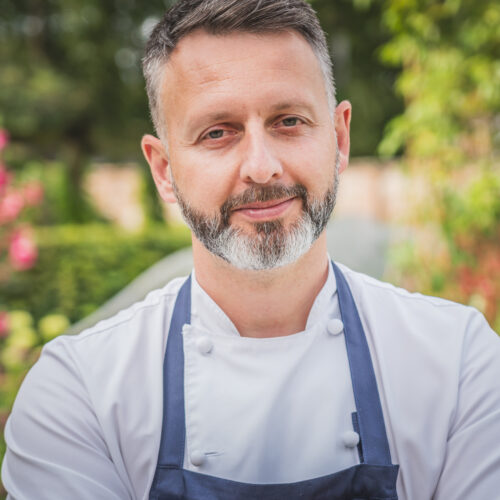
Mark Birchall won The Roux Scholarship in 2011. It was the fourth time he had reached the finals. In February 2025, fourteen years later, he became the first Roux Scholar to win a third Michelin star at his own restaurant, Moor Hall Restaurant with Rooms. Mark joins the judging panel for The Roux Scholarship alongside fellow Roux Scholars Sat Bains, Simon Hulstone, André Garrett MCA and Adam Smith MCA. He is also a judge on several chef competitions including the National Chef of the Year Awards, Master of Culinary Arts and the Eurotoques.
Mark opened Moor Hall Restaurant with rooms in March 2017, with a focus on delicate, produce-driven menus inspired by the restaurant’s exceptional surroundings and home-grown ingredients. Within six months of opening, Moor Hall received its first Michelin star, followed by a second star in the 2019 Michelin Guide. In the 2025 guide, just eight years after opening, Moor Hall was awarded three Michelin stars. The restaurant also earned a Michelin Green Star in 2022 for its commitment to sustainability. Moor Hall is one of only 34 restaurants worldwide to hold both three Michelin stars and a Green Michelin Star, and one of just two in the UK. Moor Hall holds five AA rosettes in the AA Restaurant Guide, and a World class status in the Good Food Guide.
Mark Birchall was crowned ‘Best Chef in the UK’ after winning the Chefs’ Chef of the Year award at the prestigious AA Hospitality Awards 2022, which celebrate the very best in the industry. At The National Restaurant Awards 2024, Moor Hall ranked third place in the top 100 list, having held first and then second place for the previous four years.
In October 2017, Mark launched his neighbourhood restaurant, The Barn at Moor Hall. In 2022, The Barn was awarded a Michelin Star. The Barn also holds three AA rosettes.
To find out more about Mark’s experience as a Roux Scholar, see his winner’s page.



Tell us about your experience entering The Roux Scholarship?
I entered four times. The first time, I didn't quite get the brief. It was sole with artichokes and a vegetable of my choice. I kept it almost too simple, and that was the feedback: too simple. The second time I did it, I think it was lamb with a potato garnish. I had a great dish, but I made a couple of mistakes on the day, which was just down to nerves. But then, the third time, in 2010, I knew I wanted to get to the final. I had to get to the final. I just had the extra drive, and I felt like it was close, but Kenneth Culhane won. Then the following year was my last chance. So I went in wanting to win, wanting to win so much, and I kind of gave myself that confidence and an extra edge. It just made me push a little bit harder, worked a bit faster. I was desperate to win. Because I couldn't enter again, I gave it everything. I didn't leave anything in the tank.
What was the secret to winning?
When I did it, it was a dish from Escoffier, a really classic dish. You might not know the exact dish you’re given but you can learn all the classic techniques and see the way the recipes are explained. When you read an Escoffier book, it's very different: it doesn't say fillet the Dover Sole, it says ‘lift the fillets from the Dover Sole’, and a lot of things can be misinterpreted. So I studied the book quite a lot. Yeah, you need a little bit of luck, it might be something you've done before. On the day anything can happen, really. Everyone's cooking the same dish. When I competed, none of us had cooked in that kitchen before, no one had cooked a Carré de Veau Orloff before. We had to pot roast this rack of veal, lift it off the bone, but then reconstruct it back onto the bone, with a sauce and truffle. The time you have to do it in is so tight, you really have to work hard.
How did winning The Roux Scholarship change your career trajectory?
I think there's a slight perception that you win the Scholarship and that's it, your career's on a plate. It's there for you. But it's more of a helping hand, a good boost, but you've got to put the work in. You've got to keep going with it. If I hadn't won, I'd like to think I would have carried on working in good restaurants, but the stage I did at El Celler de Can Roca was a big influence on me and my perception of dining. It was the opportunity to go and see something different but not have the responsibility of running a kitchen. And just stepping back and just seeing everything from a chef de partie perspective. I was really well looked after by them. I worked closely with the team, and across all of the sections. It's a different culture and it was a fairly new three-star as well. It was smashing it in the 50 Best, so it was a big deal. On my days off, I used the prize money to travel around Spain and dine in different two and three-star restaurants around the country. So, all of that experience helped me. At that point, I had never worked abroad before. It exposed me to a different culture and way of dining.
What is your advice to young chefs for their careers?
I don't think anything less than three years in a job is worth it, as a chef de partie, you should be working a solid three years. Because if you want to learn a section, say a kitchen has only got four sections - pastry, larder, garnish and sauce - you need a minimum of maybe eight months, six to eight months on each section to really learn and do it well. It takes three months to settle in properly and in those three months, you can have really good days, really bad days, bad weeks, good weeks etc etc. Then it starts to click in month three and four. So, your first quarter is just settling in. With social media, everything looks perfect. Instagram, your website, it's your shop window, isn't it? The picture-perfect image almost makes it look easy, but what people need to realise is the hard work and dedication which goes in to make it perfect. I think some people can have the perception that it's easy. It's not. It's a lot of work. It's a lot of dedication. What we've done here in eight years is incredible, but it's built on 26 years of me being a chef.
What are you looking forward to about judging The Roux Scholarship?
I've judged other competitions before, but it's nice to see the thought process behind The Roux Scholarship, and the thought process of judges who judged me, Brian Turner, Alain and Michel, and seeing how it is from the inside. I’m looking forward to reading entries and going through the process of the competition; going through the recipes and then finally meeting the chefs who make it through to cook and observing how they work in the kitchen in a competition environment.
What else will you be looking for?
I'm interested in seeing how people are prepared, the quality of ingredients that they take along with them. I want to see how they plan the surprise basket dessert, how they lay that out, how they're planning throughout the various stages. I want to see how they set up, how well organised they are. You will see early on how well practised people are - for example, will they take a little clock and timers. Will they have a well organised tray set up; will they take their own spoons – the familiar things which will all contribute to being well organised to make the difference; it can give you the edge. It's hard going cooking in a different kitchen, let alone having to cook a dish for judges and a surprise dessert in a competition environment.
What other advice would you give applicants?
Start with the easy job – settle the nerves! Practise, that's a given. Understand the brief. Understand what you're cooking. You're cooking one plate of food, so you get one chance, it's got to have a big impact. It must be memorable. You must make sure it is well thought out and sympathetic to the main ingredient. The dish needs to be 100% something you’d serve in your own restaurant, something your chef will maybe put on the menu, something that'll make you proud. Don't try and cut a little corner because you're under pressure. Even if you go over by one or two minutes, it’s better to do that than to finish on time if the dish isn’t quite right. When it comes to the dessert at the regional final, I think keep it simple but delicious. Practise. Get the dish right, practise it so it's an incredible dish. But then after that, practise it to make sure you can do it in the time. It's two and a half hours, so practise it to the time so you've got enough time to do a dessert.
Do you have any tips about learning classic techniques?
There is something like 5,000 recipes in Escoffier, so you're not going to learn all that, but learn the techniques. Learn the techniques for a mousse, a fish mousse, a meat mousse; all your cooking techniques, poaching, pot roasting, braising, roasting, searing, everything. Cook different types of meat: there's offal’s, whole birds, whole cuts of meat, braising, shoulders of lamb, those sorts of things. Make sure you can cook it, you can butcher it, you can fillet a fish, make sure you can make sauces with nice depth of flavour.
How can chefs get competition ready?
If you're working in a busy restaurant, it's very difficult because you're also expected to do your job. So, I think it's up to you as a competitor to give up your time. You've got to use your days off. The head chef, the sous chef will help in that time. Head chefs can give them the time to do it, but if they don’t believe that the dish is good enough to go on your restaurant menu, for example, why would you let that young chef cook it in a competition?
